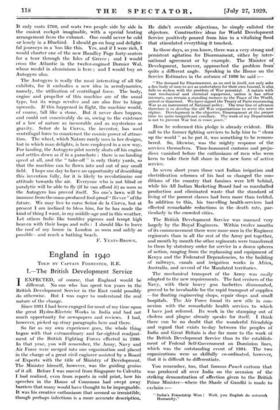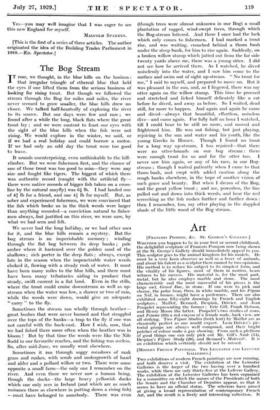England in 194o
TOLD BY CAPTAIN FORRESTER, R.E.
1.—The British Development Service
T EXPECTED, of course, that England would be -I- different. No one who has spent ten years in the British Development Service in the East could possibly do otherwise. But I was eager to understand the real nature of the change.
Since 1931 I had been engaged for most of my time upon the great Hydro-Electric Works in India and had not much opportunity for newspapers and reviews. I had, however, picked up stray paragraphs here and there.
So far as my own experience goes, the whole thing began with that extraordinary and far-sighted readjust- ment of the British Fighting Forces effected in 1930. In that year, you will remember, the Army, Navy and Air Force were merged into one organization and placed in the charge of a great civil engineer assisted by a Board of Experts with the title of Ministry of Development. The Minister himself, however, was the guiding genius of it all. Before I was moved from Singapore to Calcutta I had realized, even from reports in cold print, how his speeches in the House of Commons had swept away barriers that many would have thought to be impregnable. It was his creative enthusiasm that seemed so irresistible, though perhaps infectious is a more accurate description. He didn't override objections, he simply enlisted the objectors. Constructive ideas for World Development Service positively poured from him in a vitalizing flood that stimulated everything it touched.
In those days, as you know, there was a very strong and persistent agitation for Disarmament, either by inter-:. national agreement or by example. The Minister of Development, however, approached the problem froml quite a different angle. Speaking in the House on the Service Estimates in the autumn of 1930 he said :— " The demand for Disarmament, as an end in itself, not only asks a fine body of men to act as undertakers for their own funeral, it also fails to reckon with the problem of War potential. A nation with vast mechanical and chemical equipment, unless it has other interests, can remain a standing menace to the Peace of the World, armed or disarmed. We have signed the Treaty of Paris renouncing War as an instrument of National policy. The true line of advance therefore is to develop the old War organizations to serve the new rdgime. Development is the objective, Disarmament at the proper time its quite insignificant corollary. The work of my Department is not to prevent War but to cause peace."
How he redeemed this pledge is already evident. His call to the former fighting services to help him to " clean up the world " as he put it, was something to be remem- bered. So, likewise, was the mighty response of the services themselves. Time-honoured customs and preju- dices vanished before the enthusiasm of men who were keen to take their full share in the new form of active service.
- In seven short years those vast Indian irrigation and electrification schemes of his had so changed the con- ditions of the country that famines were left behind, while his All Indian Marketing Board had so marshalled production and eliminated waste that the standard of living of the poorest classes had been more than trebled. In addition to this, his travelling health-services had effected remarkable reductions in the death rate, par- ticularly in the crowded cities.
The British Development Service was manned very largely by the Royal Engineers. Within twelve months of its commencement there were more men in the Engineer regiments than in all the rest of the Army put together, and month by month the other regiments were transferred to them by statutory order for service in a dozen spheres of action, ranging from the replanning and equipment of Kenya and the Federated Dependencies, to the building of railways, canals and irrigation works in Africa, Australia, and several of the Mandated territories.
The mechanical transport of the Army was easily adapted to the new requirements. The fast cruisers of the Navy, with their heavy gun barbettes dismounted, proved to be invaluable for the rapid transport of supplies —for floating engineering shops, repair shops and small hospitals. The Air Force found its new role in con- nexion with the remarkable health services to which I have just referred. Its work in the stamping out of cholera and plague already speaks for itself. I think there can be no doubt that the wonderful friendship and regard that exists to-day between the peoples of India and Great Britain is due far more to the work of the British Development Service than to the establish- ment of Federal Self-Government on Dominion lines, which was the outstanding event of 1934. The two organizations were so skilfully co-ordinated, however, that it is difficult to differentiate.
You remember, too, that famous Punch cartoon that was produced all over India on the occasion of the striking demonstration of affection given to the British Prime Minister—where the Shade of Gandhi is made to exclaim :- "India's Friendship Won ! Well, you English do astonish Humanity." Yes—you may well imagine that I was eager to see this new England for myself.
MALCOLM SPARKES.
[This is the first of a series of three articles. The author originated the idea of the Building Trades Parliament in 1918.—En. Spectator.]



































 Previous page
Previous page